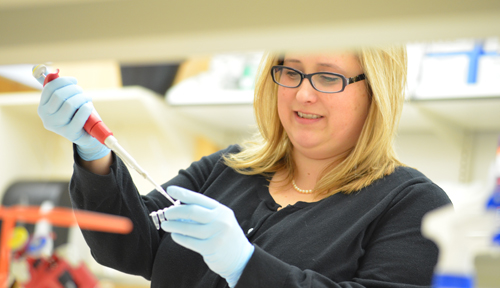R. Kate Hyde, Ph.D., a new assistant professor of biochemistry and molecular biology, was a post-grad, already working on the control of gene expression, genes involved in cancer, when her dad got sick.
It was leukemia.
They knew it was serious when he told his wife, who was always cold, that he finally understood what she’d been complaining about all these years.
And as tough as he was, it took him. He died in 2003, just short of two years after his diagnosis, just about typical for the kind of leukemia he had.
Cancer is . . . awful. Uncertainty, deterioration, tests, treatments that seem to beat you down as much as they help. Kate decided something: “I already knew I wanted to do research,” she said.
She knew she needed to pick something that she cared about, that she would work on for the entirety of her career. “So I picked this.”
At UNMC, she’s excited to be setting up her own lab for the first time. She is armed with a National Institutes of Health Pathway to Independence award and an idea.
As a postdoc she was working on a project, but it took forever. She asked her mentor for something to do in the meantime. He gave her something that had been set aside.
The initial experiment at first didn’t make any sense, but the result was interesting. One thing led to another, until she realized: “We could use this model to look at a pre-leukemic state.”
Now, she works with mouse models with a subtype of acute myeloid leukemia. The difference is that now they can study the disease from its first mutation.
“When you see a patient in clinic, it’s only after full blown leukemia,” Dr. Hyde said. “You don’t know what the initial stages are. But with the mouse model, we can control when they start expressing the protein that we know is the first step. We look at the consequences of this one protein by itself without the complications of the other mutations found in patient samples.”
Understanding how this first happens is integral to drug design and drug testing, Dr. Hyde said. This is what she works on.
For her dad?
She had to laugh a little at that: “I’m not in there every day like, ‘This is for you, Dad!’ ”
But, she always knew she was going to be a scientist. All she needed was a direction. Now she has one.
And she can’t wait to get started at UNMC.
